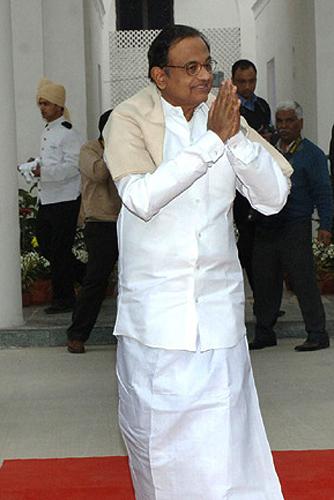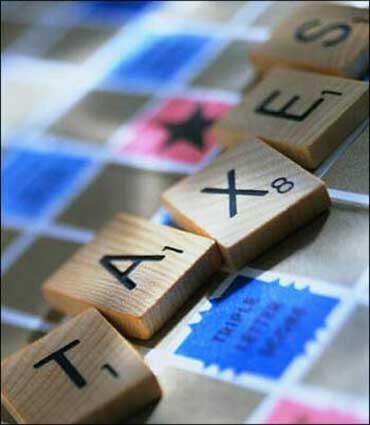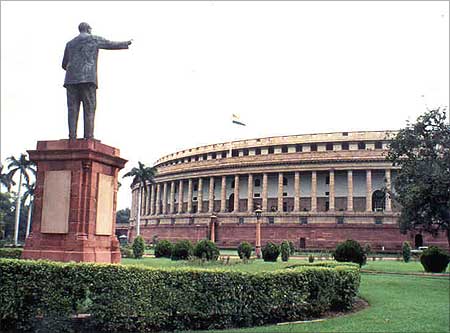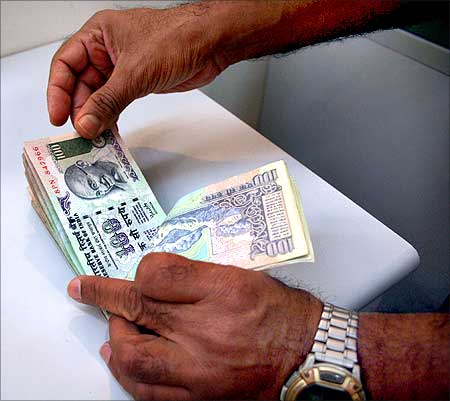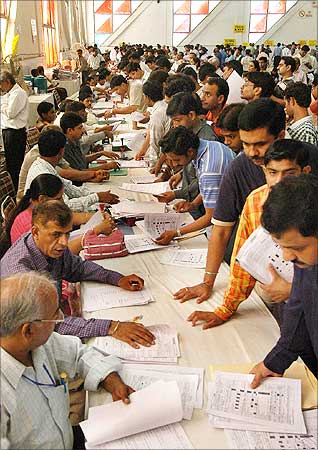 | « Back to article | Print this article |
Budget 2013: The wrong way to raise revenue
This Budget should have reduced exemptions, not raised tax rates, writes Sukumar Mukhopadhyay
Bridging the fiscal deficit and facilitating investments were the prime concerns of Budget 2013.
To that end, it was necessary to increase the generation of revenue, which has been done. But it has been done only through the route of higher tax rates, and not through withdrawing exemptions, reducing undue expenditure and introducing reforms.
Those measures would have better achieved the goal of a more effective tax regime.
As far as revenue generation is concerned, the finance minister has rightly raised the rates on goods consumed by the richer class.
Click NEXT to read further. . .
Speak to experts on Live Chat!
Union Budget, as it unfolded on February 28
Complete coverage: Union Budget 2013-14
Budget Impact Live!
Budget 2013: The wrong way to raise revenue
Customs duty on sport utility vehicles has been increased from 75 per cent to 100 per #162 on motorcycles with engine capacity of 800cc from 65 per cent to 75 per #162 and on yachts from 10 per cent to 25 per cent.
Excise duty on mobile phones priced at more than Rs 2,000 has been increased from one per cent to six per cent.
Excise duty on SUVs has been increased from 27 per cent to 30 per cent -- but that will not apply to those used as taxis.
This is a totally unmerited exemption, since the duty increase is only three per cent, and users of SUV taxis also belong to the rich class.
The exemption is operated by a refund route, which causes a lot of administrative problems.
Click NEXT to read further. . .
Speak to experts on Live Chat!
Union Budget, as it unfolded on February 28
Complete coverage: Union Budget 2013-14
Budget Impact Live!
Budget 2013: The wrong way to raise revenue
Excise duty on marble has been increased from Rs 30 to Rs 60 per square feet since the rate was fixed 16 years ago.
But in 16 years, the price has much more than doubled.
The rate should have been made ad valorem, so that the price increase would have fetched more duty to the government automatically.
Duty on cigarettes has been increased 18 per cent, except those of and below 65 mm in length (which are of cheaper quality).
So, the idea is not to make it a 'sin tax' -- but make it a tax for revenue.
Certain administrative actions taken in this Budget need special attention.
Click NEXT to read further. . .
Speak to experts on Live Chat!
Union Budget, as it unfolded on February 28
Complete coverage: Union Budget 2013-14
Budget Impact Live!
Budget 2013: The wrong way to raise revenue
The most important is the Goods and Services Tax.
A clear indication about the road map towards the introduction of GST is welcome.
Even the reservation of Rs 9,000 crore (Rs 90 billion) towards the compensation for the loss of the central sales tax for states is clear progress towards the avowed goal.
But the finance minister's statement, in paragraph 186 of the Budget speech, that ". . .my recent meetings with the Empowered Committee. . . have made me believe that the state governments . . . are agreed that there is a need for a Constitutional amendment", is not in order.
It is not factually correct that the agreement has taken place now.
The agreement has been in place for a long time.
In fact, the 115th Constitutional Amendment Bill, 2011 was placed in Parliament and followed up with subsequent parliamentary procedures.
Click NEXT to read further. . .
Speak to experts on Live Chat!
Union Budget, as it unfolded on February 28
Complete coverage: Union Budget 2013-14
Budget Impact Live!
Budget 2013: The wrong way to raise revenue
Another procedural change proposed is to tighten the operation of Section 49 of the Customs Act, which allows traders to keep imported goods in godowns without actually bonding them, when the goods are not cleared owing to controversies.
It is an age-old facility for importers who are otherwise hassled owing to many hurdles not always of their own creation.
Now, to propose that month-to-month extensions will be given to such permissions will make the life of importers more miserable.
It is a retrograde step and should be withdrawn.
The third administrative step is the introduction of non-bailable provisions in respect of certain offences in Customs, which has been necessitated by a Supreme Court judgment.
Click NEXT to read further. . .
Speak to experts on Live Chat!
Union Budget, as it unfolded on February 28
Complete coverage: Union Budget 2013-14
Budget Impact Live!
Budget 2013: The wrong way to raise revenue
This is a welcome measure.
The fourth measure is to allow the tribunal to grant a stay of 185 days if the delay is not because of the taxpayer.
Also, the power of a single member of the tribunal has been increased from Rs 10 lakh (Rs 1 million) to Rs 50 lakh (Rs 5 million).
Both these measures are taxpayer-friendly, but the limit should be increased to Rs 1 crore (Rs 10 million) since there is often a shortage of members in the tribunal.
Stay petitions should have also been allowed to be disposed of in revenue cases by a single member.
Click NEXT to read further. . .
Speak to experts on Live Chat!
Union Budget, as it unfolded on February 28
Complete coverage: Union Budget 2013-14
Budget Impact Live!
Budget 2013: The wrong way to raise revenue
The advance ruling facility has been liberalised and extended to cover resident public limited companies, a long-standing demand.
This has been a good administrative measure that speaks well of this Budget.
The voluntary compliance scheme for service tax, however, has been described as a 'one-time' measure -- but it never remains one-time.
This is a retrograde step.
Where the Budget has fallen short is in regard to not introducing reforms that are often emphasised by analysts and economists, and are routinely ignored by bureaucrats and policy makers.
First, while two more items have been added to the negative list, the whole big list of exemptions, known in popular parlance as the mega exemption list, has been left untouched.
Click NEXT to read further. . .
Speak to experts on Live Chat!
Union Budget, as it unfolded on February 28
Complete coverage: Union Budget 2013-14
Budget Impact Live!
Budget 2013: The wrong way to raise revenue
It deserved to be mercilessly pruned, which would also have given good revenue to the government.
Even in Customs and excise, there is considerable scope to withdraw exemptions, which has not been done at all.
The exemption on service tax on copyright on cinematography, which has been limited, should have been withdrawn.
There is no progress on ad valoremisation of duties that started in the 1990s. Even now, duties on cement, marble and textiles are not ad valorem.
The benefit of inflation comes when the duties are on value.
If the department is still against it, what would the reaction be when GST is enforced?
It is high time it changed its mindset.
Click NEXT to read further. . .
Speak to experts on Live Chat!
Union Budget, as it unfolded on February 28
Complete coverage: Union Budget 2013-14
Budget Impact Live!
Budget 2013: The wrong way to raise revenue
Some anomalies like difference in duty between hand-made and machine-made still continue, which should have been abolished.
On an overall basis, the Budget has done well to increase revenue by taxing the rich.
Some changes in administrative procedures are present, though not all are smart; but more was expected in widening the tax base by removing exemptions.
There is no logic for foregoing potential revenue by allowing people to eat ice cream paying only six per cent against the normal rate of 12 per cent for other food items.
Nor should such hard-earned revenue be spent in making an all-women bank, which is not in consonance with either gender-respect or economic sense.
The author is former member, Central Board of Excise and Customs
